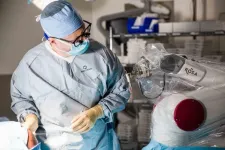(Press-News.org) Certain gut-dwelling fungi flourish in severe cases of COVID-19, amplifying the excessive inflammation that drives this disease while also causing long-lasting changes in the immune system, according to a new study led by investigators at Weill Cornell Medicine and NewYork-Presbyterian. This discovery identifies a group of patients who may benefit from specialized, but yet-to-be determined treatments.
Utilizing patient samples and preclinical models, the research team determined that the growth of fungi in the intestinal tract, particularly strains of Candida albicans yeast, trigger an upsurge in immune cells whose actions can exacerbate lung damage. Their findings, published in Nature Immunology on Oct. 23, also elucidate that patients retain a heightened immune response and immune memory against these fungi for up to a year after the resolution of SARS-CoV-2 infection. The research reveals a new dimension of the complex pathology unleashed by severe COVID-19, according to senior author Dr. Iliyan Iliev, an associate professor of immunology in medicine in the Department of Medicine, co-director of the Microbiome Core Lab and a member of the Jill Roberts Institute for Research in Inflammatory Bowel Disease at Weill Cornell Medicine.
“Severe and long COVID-19 were not thought to involve fungal blooms in the intestines that, in addition to the virus, can impact patient’s immunity,” he said.
Dr. Iliev, an immunologist who studies the microbiome and the chronic inflammatory conditions targeting the gastrointestinal tract, pivoted to COVID-19 during the pandemic. As researchers gained a better handle on the new viral infections, it became clear that, in COVID-19 as in inflammatory bowel disease, the body’s own inflammatory immune response causes harm.
To investigate this errant immune response, Dr. Iliev and Dr. Takato Kusakabe, a postdoctoral fellow and a first author in the study, worked with numerous colleagues to acquire three large clinical cohorts of COVID-19 patients and develop a mouse model to study the disease. They collaborated with members of the Weill Department of Medicine and the Department of Pathology and Laboratory Medicine at Weill Cornell Medicine, including Dr. Stephen Josefowitz, Dr. Mirella Salvatore, Dr. Melissa Cushing, Dr. Lars Westblade, and Dr. Adolfo García-Sastre, a professor of microbiology and director of the Global Health and Emerging Pathogens Institute of the Icahn School of Medicine at Mount Sinai.
How Gut Fungi Harm the Lungs
The team first made the connection when analysis of blood samples from patients at New York-Presbyterian/Weill Cornell Medical Center diagnosed with severe COVID-19 unveiled the presence of antibodies tuned to attack fungi common to the gut. The researchers then found that populations of yeast, and one species in particular, Candida albicans, increased in the intestines of the patients during the course of severe COVID-19.
When they looked at the patients’ immune systems, the researchers found a parallel increase in immune cells called neutrophils. In severe COVID-19, excessive numbers of neutrophils appear in the lungs, where their activity worsens the inflammatory response already damaging these organs.
Turning to preclinical models, the investigators found that mice bearing fungi from patients with severe COVID-19 produced more neutrophils in their blood and lungs, and had signs of heightened inflammation when infected with SARS-CoV-2. However, giving them an antifungal drug reduced these effects.
The Immune System Remembers
From within patients’ blood samples, researchers also uncovered evidence of persistent changes to the immune system they believe are related to a condition known as long COVID-19, in which symptoms linger, or new ones develop, after an infection has cleared.
When the team examined patients’ blood up to a year afterward, they found it still contained anti-fungal antibodies. In addition, when they looked at the stem cells that give rise to neutrophils, the researchers found that these progenitors are primed to respond to fungi. They found that an immune protein called IL-6 that these fungi induce, appears to bolster both the neutrophils and the antibodies.
Further experiments showed that blocking IL-6 in the patients or in mice dampened this immunological memory, causing the presence of neutrophils and antibodies to wane.
While these results do not have immediate implications for treating severe or long COVID-19, they suggest new opportunities to tailor therapy, according to Dr. Iliev. For example, anti-fungal antibodies could potentially serve as a marker to identify patients who might benefit from a therapy that targets the fungi or the immunological changes they instigate. Or, assuming further research supports it, the antibodies’ presence could indicate someone might be at risk for long COVID-19. The team’s discoveries may also have relevance beyond COVID-19, said Dr. Iliev, who notes this research could open new avenues of exploration for the treatment of other infectious and inflammatory diseases.
END
Gut fungi's lasting impact on severe COVID-19 immune response
2023-10-23
ELSE PRESS RELEASES FROM THIS DATE:
Who were the first modern humans to settle in Europe?
2023-10-23
Before modern humans settled definitively in Europe, other human populations left Africa for Europe beginning approximately 60,000 years ago, albeit without settling for the long term. This was due to a major climatic crisis 40,000 years ago, combined with a super-eruption originating from the Phlegraean Fields volcanic area near current-day Naples, subsequently precipitating a decline in ancient European populations. To determine who the first modern humans to settle definitively in Europe were, a team led by CNRS scientists1 analysed the genome of two skull ...
Alem & Narayanan advancing infectious disease capabilities through Biomedical Research Laboratory core support
2023-10-23
Alem & Narayanan Advancing Infectious Disease Capabilities Through Biomedical Research Laboratory Core Support
Farhang Alem, Interim Director of the Biomedical Research Laboratory, Institute for Biohealth Innovation, and Aarthi Narayanan, Professor, Biology, received funding for the project: "Advancing Infectious Disease Capabilities through BRL Core Support."
As part of this project, Alem and Narayanan will: 1) implement a comprehensive BSL-3 facilities preventative maintenance and upgrade plan to ensure continuity of operations, compliance with federal regulations, and a safe and secure facility; 2) enhance safety ...
Ramseur to receive funding for APA fellowship - APA Minority Fellowship Program (MFP)
2023-10-23
Ramseur To Receive Funding For APA Fellowship - APA Minority Fellowship Program (MFP)
Kevin Ramseur, II, a Mason doctoral student studying clinical psychology, is set to receive funding for: "APA Fellowship – APA Minority Fellowship Program (MFP)."
Ramseur will receive $27,144 from the American Psychological Association on a subaward from the Substance Abuse and Mental Health Services Administration (SAMHSA). This funding will begin in Oct. 2023 and will end in late Sept. 2024.
###
About George Mason University
George Mason ...
Doebel innovating developmental science with an online, scalable meta-science platform for investigating cognitive development during early childhood
2023-10-23
Doebel Innovating Developmental Science With An Online, Scalable Meta-Science Platform For Investigating Cognitive Development During Early Childhood
Sabine Doebel, Assistant Professor, Psychology, received $2,784 from the University of Texas at Dallas on a subaward from the National Science Foundation for: "Subaward Project GARDEN: Innovating Developmental Science with an Online, Scalable Meta-Science Platform for Investigating Cognitive Development During Early Childhood."
Regarding the importance of the project, Doebel said, "Project GARDEN will leverage online methodologies to gather data from a large, ...
Debus-Sherrill receives supplemental funds for elevate academy for juvenile providers
2023-10-23
Debus-Sherrill Receives Supplemental Funds For Elevate Academy For Juvenile Providers
Sara Debus-Sherrill, Senior Research Associate, Center for Advancing Correctional Excellence (ACE!), received $153,424 from County of Alameda for: "Supplemental Funds for Elevate Academy for Juvenile Providers." This funding began in Aug. 2023 and will end in late June 2024.
Debus-Sherrill said, "This project funds the development and delivery of a training academy for community-based organizations providing services to justice-involved youth in Alameda County, California."
###
About George Mason University
George ...
Parsa studying design of joint 3D solid-state learning machines for various cognitive use-cases
2023-10-23
Parsa Studying Design Of Joint 3D Solid-State Learning Machines For Various Cognitive Use-Cases
Maryam Parsa, Assistant Professor, Electrical and Computer Engineering, received funding from the National Science Foundation for the project: "Collaborative Research: NCS-FR: DEJA-VU: Design of Joint 3D Solid-State Learning Machines for Various Cognitive Use-Cases."
In this collaborative project, Parsa joins a team of faculty members from the University of Wisconsin Madison (Dr. Akhilesh Jaiswal), and the University of California Irvine (Dr. Babak Shahbaba and Dr. Norbert ...
New study confirms safety and benefits of maternal COVID-19 vaccination for newborns
2023-10-23
Toronto, ON, October 23, 2023 – Infants of pregnant women who received an mRNA COVID-19 vaccine during pregnancy had lower risks of severe health outcomes, neonatal death, and neonatal intensive care unit (NICU) admission, according to a new study from researchers at ICES and the University of Toronto.
Published in JAMA Pediatrics, the study included more than 140,000 infants in Ontario, and also showed that newborn and six-month readmissions to the NICU did not increase in infants of mothers vaccinated during pregnancy.
"Our results were consistent across the number of doses someone received during pregnancy, the trimester in which they were ...
Newborn and early infant outcomes following maternal COVID-19 vaccination during pregnancy
2023-10-23
About The Study: In this study of 142,000 live births in Ontario, Canada, maternal mRNA COVID-19 vaccination during pregnancy was associated with lower risks of severe neonatal morbidity, neonatal death, and neonatal intensive care unit admission and no increase in neonatal readmission or hospital admission up to age six months, compared with no maternal COVID-19 vaccination before delivery.
Authors: Jeffrey C. Kwong, M.D., M.Sc., of ICES in Toronto, is the corresponding author.
To access the embargoed study: Visit our For The Media website at this link https://media.jamanetwork.com/
(doi:10.1001/jamapediatrics.2023.4499)
Editor’s ...
Prenatal lead exposure, genetic factors, and cognitive developmental delay
2023-10-23
About The Study: In this study of 2,361 mother-child pairs followed up prenatally to child age of approximately two years, prenatal lead exposure was associated with an increased risk of cognitive developmental delay (CDD) in children, especially in those with a high genetic risk. These findings suggest that prenatal lead exposure and genetic background may jointly contribute to an increased risk of CDD for children and indicate the possibility for an integrated strategy to assess CDD risk and improve ...
Researchers use pioneering new method to unlock brain’s noradrenaline system
2023-10-23
An international team of researchers has provided valuable insights into the brain’s noradrenaline (NA) system, which has been a longtime target for medications to treat attention-deficit/hyperactivity disorder, depression, and anxiety.
Equally important beyond the findings is the groundbreaking methodology that the researchers developed to record real-time chemical activity from standard clinical electrodes which are routinely implanted for epilepsy monitoring.
Published online in the journal Current Biology on Monday (Oct. 23), the research not only provides new insights into the brain’s chemistry, which could have implications ...

